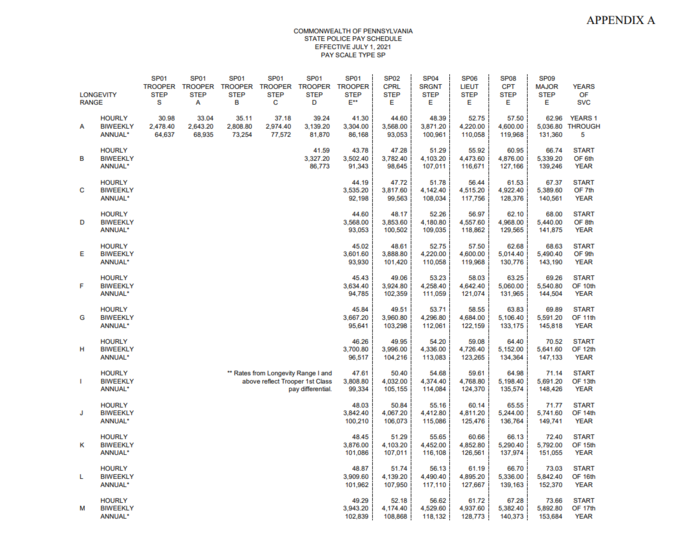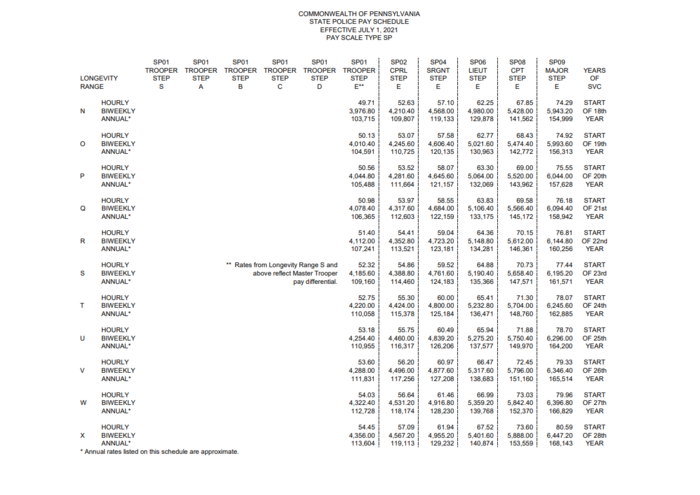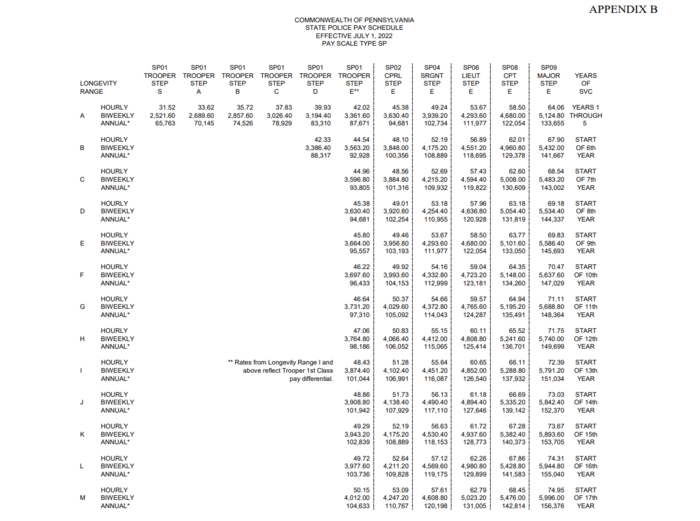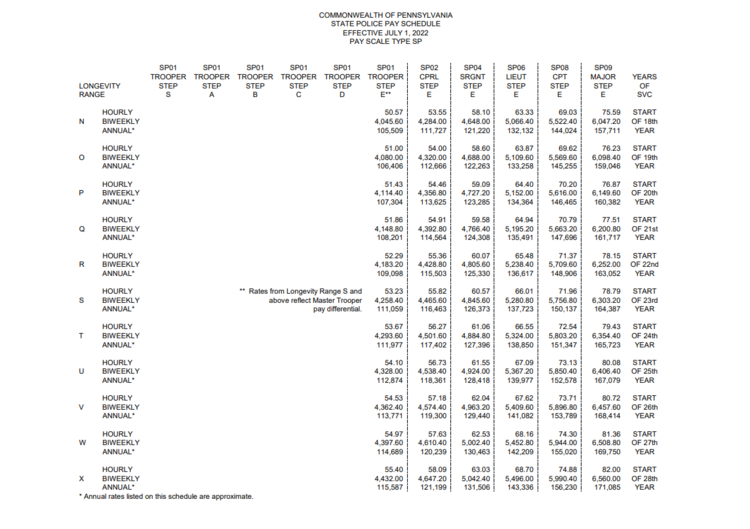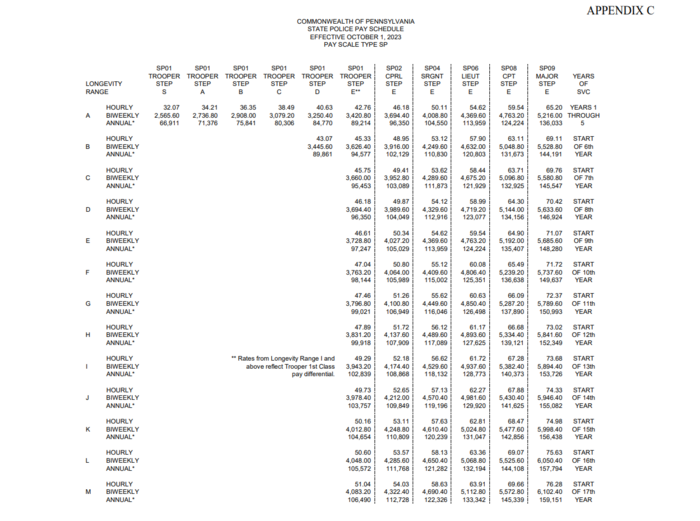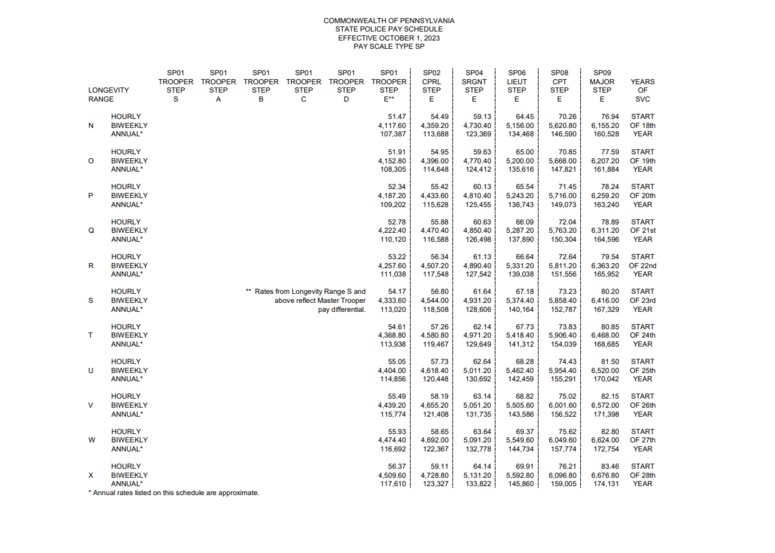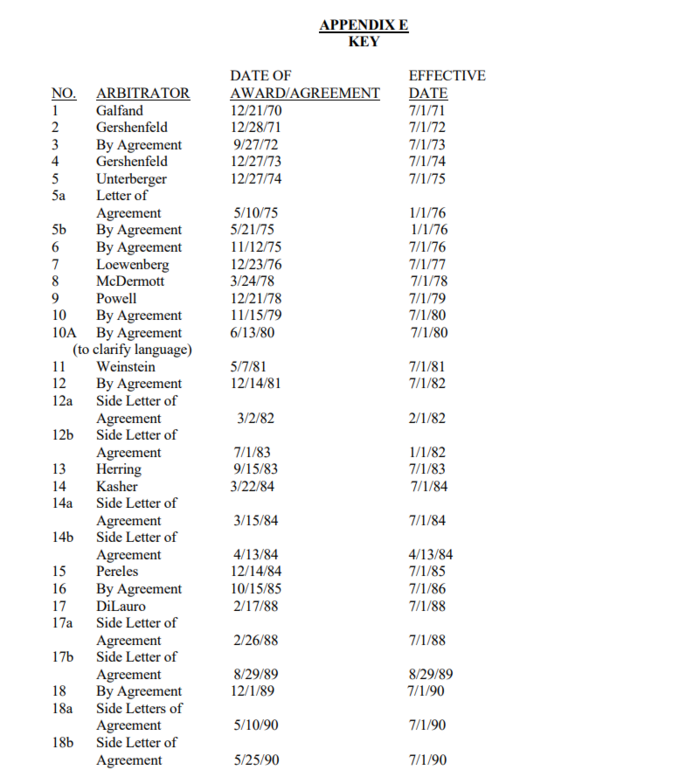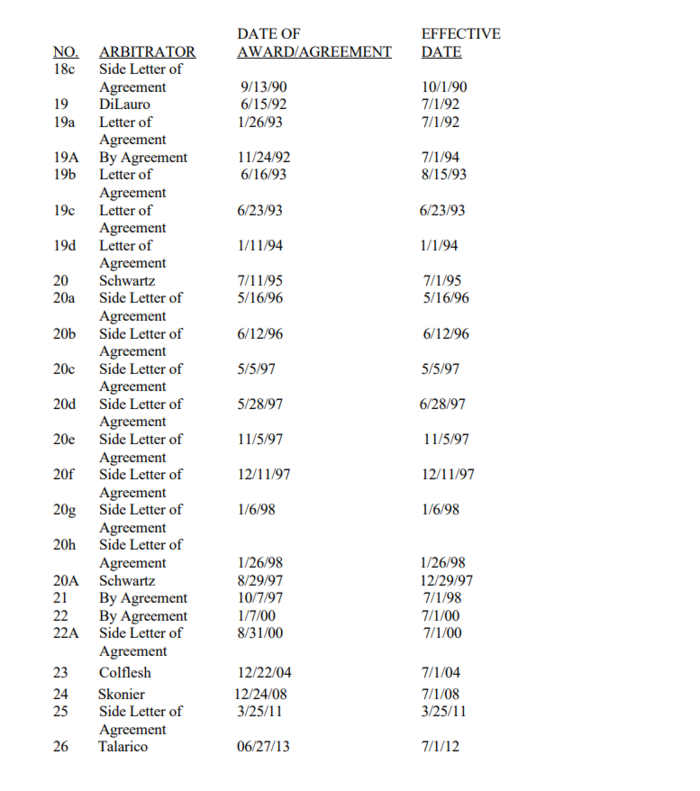|
Section 1. Scope
Grievances are limited to matters involving interpretation of this Agreement including all
matters of discipline, and grant or termination of Heart & Lung Act benefits, compensation and
reimbursement under FR 4-1, Loss of or Damage to State Property and Equipment if in excess of
$250, and FR 5-1, Travel and Subsistence.
Section 2. Grievance Steps
STEP 1. The member, either alone or accompanied by a PSTA representative, or the
PSTA where entitled, shall present the grievance in writing to the member's Troop
Commander/Bureau Director within 15 calendar days of its occurrence or knowledge of its
occurrence.
Within 10 calendar days, the Troop Commander/Bureau Director or his/her designee shall
conduct a hearing and provide a written STEP 1 decision to the member or the PSTA representative.
If additional information is provided by the member or the PSTA representative, the time
limits may be extended an additional five calendar days to review or further investigate the data.
Prior to the grievance submission to STEP 2, the grievance may be amended by the member or the
PSTA representative.
A member may appeal discipline beginning at STEP 2 of the grievance procedure, within 15
calendar days of the notice of discipline the member receives from the Disciplinary Officer. The
grievance must be presented in writing and received or postmarked to the Office of Administration,
Bureau of Labor Relations within the 15 calendar day period to be considered timely.
STEP 2. In the event the grievance has not been satisfactorily resolved in STEP 1,
written appeal, if made, shall be by the member or PSTA to the Office of Administration, Bureau of
Labor Relations, 404 Finance Building, Harrisburg, PA 17120. The written appeal shall be made
and postmarked within five calendar days of the Troop Commander's/Bureau Director's STEP 1
written decision. The written appeal to STEP 2 shall contain a copy of the grievance and a copy of
the STEP 1 decision. Discipline grieved directly to STEP 2 shall also include a copy of the grievant's
DAR, the grievant's response, if applicable, notification of disciplinary action, the grievant's
proposed witnesses and all other supporting documents. A copy will also be sent to the PSTA
President, 3625 Vartan Way, Harrisburg, PA 17110.
Upon receipt of the grievance at STEP 2, either the representative from the Bureau of Labor
Relations or the PSTA Grievance Board Chairman shall schedule a grievance committee meeting
consisting of members from the Employer (no more than five) and the PSTA Grievance Board (no
more than five). The joint committee shall meet at least one day per month, unless the parties
mutually agree otherwise.
The grievance committee shall meet for the purpose of reviewing the grievance(s) previously
denied in writing at STEP 1 and appealed to STEP 2 and matters of discipline grieved directly to
STEP 2. A list of grievances to be discussed shall be sent to the Bureau of Labor Relations'
representative and the Director, Bureau of Human Resources, Pennsylvania State Police by the
PSTA Grievance Board Chairman, within seven calendar days, when possible, prior to the grievance
committee meeting. All amendments of grievances, if any, shall be done at the meeting of the
grievance committee.
STEP 3. If the grievance is not satisfactorily resolved by the grievance committee at
STEP 2, the grievance may be scheduled for arbitration by the PSTA Grievance Board Chairman by
serving upon the Bureau of Labor Relations' representative notice, within 10 calendar days of the
grievance committee meeting, of its intent to proceed to arbitration. The Bureau of Labor Relations
representative and the PSTA Grievance Board Chairman shall determine hearing dates and arbitrator
availability.
Effective July 1, 2021, all newly filed grievances that are not governed by the Expedited
Arbitration Procedure outlined in Section 16 of this Article and that are not remedied at Steps 1 or
2 of the Grievance Procedure will be heard before an arbitrator no more than 90 calendar days
following the PSTA subsequently serving written notice of the intent to proceed to arbitration.
Either party may extend this timeframe by no more than an additional 90 calendar days upon
serving written notice to the other party within the original 90 day timeframe. Grievances covered
under the provisions of this paragraph may be heard before an arbitrator more than 180 calendar
days following the PSTA serving written notice of the intent to proceed to arbitration only upon
mutual agreement of the parties.
The Employer's decision at STEP 1 and the Committee's decision at STEP 2 shall not be
used as a precedent for any subsequent case.
'Section 3. Grievance Processing
An aggrieved member and PSTA representative, if member, and a reasonable number of
witnesses, when required, shall be granted reasonable time during working hours, if required, to
process grievances in accordance with this Article without loss of pay or leave time.
Section 4. PSTA Representation
The PSTA must have an opportunity to appear with the grievant at all steps of the grievance
procedure. Subsequent to the issuance of the Disciplinary Officer's letter of adjudication the PSTA
shall have the right to investigate all issues not incorporated within an investigation against a
member, provided the issue has been brought to the attention of the Department and the Department
chooses not to investigate the issue. Such follow-up investigation shall occur during off-duty hours,
a member's badge of office shall not be used, and any expenses incurred therewith shall be borne
exclusively by the PSTA.
Section 5. Grievance Resolution
The PSTA Grievance Board shall have the authority to settle, amend, or withdraw any
grievance which does not have merit, does not comply with the time frames stated previously above,
or does not comply with the guidelines established by the PSTA.
Section 6. Arbitrator and Site Selection
Five neutral arbitrators are to be selected by the parties jointly to hear cases in the above
procedure.
Either party may, at any time, remove a neutral arbitrator, selected by the parties, after giving
the other party at least 15 days’ notice.
When a vacancy exists on the list of arbitrators, the parties should attempt to agree on a
replacement within 10 calendar days. If the parties cannot agree, the parties shall request the
American Arbitration Association to submit a list of seven arbitrators. Upon receipt of such list, the
parties shall alternately strike until one arbitrator needed to fill a vacancy remains. A new list shall
be requested from the American Arbitration Association for each arbitrator to be selected. Only one
arbitrator is to be selected from each list. The Commonwealth shall strike first.
The parties may mutually agree to schedule a hearing at a location agreeable to both. For
discipline grievances, the hearing site will be at a neutral location within the geographical area of the
Troop where the grievance arose, unless mutually agreed otherwise.
When the parties cannot agree to a hearing location due to a disagreement over the nature of
the case, then the hearing site will be decided by the neutral arbitrator.
Section 7. Arbitrator Responsibility
Issues concerning timeliness or procedurally defective cases or matters on arbitrability will
be decided prior to hearing the merits of the grievance. The arbitrator shall neither add to, subtract
from, nor modify the provisions of this Agreement or of the arbitration awards. The arbitrator shall
confine himself/herself to the precise issue submitted for arbitration and shall have no authority to
determine any other issues not so submitted to him/her. In those matters involving discipline for
actions specifically set forth in Article 26, Section 13, Appendix D, Subsections [1] - [12], the
arbitrator shall be limited to determining just cause and may not alter the penalty imposed by the
Department.
The decision of the arbitrator shall be final and binding on both parties. The arbitrator shall
be requested to issue his/her decision within 30 days after the record is closed, but not to exceed 60
days.
If briefs are to be submitted, they must be postmarked within 15 working days of the hearing
or the arbitrator shall decide the case without the late party's brief.
All of the time limits contained in the Article may be extended by mutual agreement. If the
Commonwealth fails to respond in a timely manner in any step of the grievance procedure, the
grievant and/or the PSTA may process the grievance to the next Step in the procedure.
All fees and expenses of the arbitrator shall be divided equally between the parties. Each
party shall bear the cost of preparing and presenting its own case. Either party desiring a record of
the proceedings shall pay for the record and make a copy available without charge to the arbitrator.
'Section 8. Heart and Lung Claims
Matters dealing with Heart & Lung shall be addressed in AR 4-4 as agreed to. Subsequent
changes in AR 4-4 Heart & Lung Procedures shall be subject to bargaining. Grievances arising from
the grant or termination of Heart & Lung Act benefits shall be subject to the Grievance Procedure
specified in this Article.
Section 9. Reimbursement/Compensation Issues
All issues dealing with the application of compensation and reimbursement under FR 4-1,
Loss of or Damage to State Property or Equipment, and FR 5-1, Travel & Subsistence, as presently
written or modified by the Department, shall be submitted to a Board made up of one representative
from the Department, one from the Office of Administration and one from the PSTA. The findings
of the Board shall be final and binding for Loss of or Damage to State Property or Equipment
involving $250 or less. In all other cases arising under this Section, the decision of the Board shall
be subject to the Grievance Procedure specified in this Article, except that grievances should be
submitted directly to Step 2.
It is understood by the parties that the Board/Arbitrator shall have no authority to amend the
Commonwealth's travel regulations.
Section 10. Grievance/Court-Martial Procedure Selection
In the event a member is accused of an offense that would otherwise be subject to courtmartial proceedings under Article 26, he/she shall be advised as follows:
Subsequent to the issuance of a DAR by the Troop Commander, if the Disciplinary Officer,
with the concurrence of the Deputy Commissioner of Administration and Professional
Responsibility, directs that the member be court-martialed, the following shall apply for
the selection of either court-martial procedure or grievance procedure:
a. The member will receive written notice (form) that he/she may elect to
challenge the accusation either through the court-martial procedure or the
grievance procedure within seven calendar days. When made, the election
shall be irrevocable. If not made in a timely manner, it shall be conclusively
presumed that the member has elected the grievance procedure.
b. The written notice (form) will state no matter which procedure the member
selects, he/she is subject to disciplinary action up to and including but not
limited to dismissal, transfer, reduction in rank and/or potential suspension in
excess of 30 days.
c. If the member selects the court-martial procedure, a request will be made of
the Governor to convene such proceedings at which time charges and
specifications will be issued, in writing, to the member.
d. If the member selects the grievance procedure, the Commissioner will
determine the appropriate penalty, and a written notice will be issued to the
member stating the disciplinary action to be taken and the underlying facts in
support thereof in accordance with the timeframes in Article 26, Section 7.c.
(2). After receiving the Commissioner's decision the normal grievance
procedure will then apply.
Section 11. Penalty Imposition
Subject to the provisions of Article 26, Section 6, Subsection g., a penalty of suspension
without pay shall be implemented at any point in time following receipt of the Notice of
Disciplinary Penalty by the member accused of misconduct. The implementation of the penalty
can be delayed upon mutual agreement of the parties.
Notwithstanding the foregoing provisions of Sections 10 and 11 herein above, where removal
from duty is required at any time due to the nature of the offense, the Department may suspend a
member in accordance with Article 26, Section 3.
Section 12. Administrative Leave
Administrative leave shall be for the time that coincides with the grievant's or witnesses'
work schedule, not to exceed a full shift. On the day of the hearing, the grievant/witness shall be
scheduled on a day shift (a shift for which shift differential is not paid). For this accommodation, no
overtime can be charged by the grievant/witness in respect to other sections of this contract.
A grievant and/or witnesses, when required to travel a distance exceeding 100 miles from
his/her regular station to the arbitration site, shall not be required to work a shift commencing after
8:00 a.m. the day prior to the arbitration hearing date unless a clear and present danger/emergency
exists.
All witnesses granted administrative leave time shall be required to testify unless excused
mutually by the parties.
Requests for administrative leave shall be presented in writing to the Office of
Administration, Bureau of Labor Relations, at least 14 days prior to the arbitration hearing date,
except for unforeseen circumstances, in which case leave shall not be unreasonably denied.
Up to five members appointed by the PSTA to serve on the Grievance Board shall receive
sufficient time to review grievances and attend STEP 2 Grievance Committee meetings without loss
of leave or compensation. It is agreed that all members appointed by the PSTA shall be active
members.
Section 13. Annual Review
The Commonwealth and the PSTA shall meet yearly to review the grievance procedure. The
procedure can be modified at any time by agreement between the parties.
Section 14. Agreement
The foregoing represents the parties' entire agreement with regard to Article 28, Grievance
Procedure, and any previous side-letters concerning this Grievance Procedure Article are no longer
in effect.
Section 15. Definitions
The term member shall include probationary Troopers except where excluded.
Section 16. Expedited Arbitration Procedure
In any case where (1) a disciplinary penalty has been imposed on a member following
service of a Notice of Disciplinary Penalty, and (2) the PSTA has made a written demand for
arbitration to the Commonwealth’s Bureau of Labor Relations within 10 calendar days of service
of the Notice upon the PSTA, the matter shall be heard before an arbitrator or a court martial board
within 61 calendar days following the date that the grievance was discussed at STEP 2 of the
grievance procedure in accordance with Section 2 of this Article. In the event the matter is not
heard within that time period, and the delay is not attributable to the PSTA or the member, the
penalty must be rescinded until such time as an arbitrator sustains the penalty. Delays attributable
to the member or PSTA, including the failure to make a demand for or to schedule the arbitration,
shall not result in rescission of the penalty. Should the PSTA not make a written demand for
arbitration within the ten day time period, the right to arbitration shall be deemed to have been
waived.
To implement the 61 day requirement, the parties shall immediately appoint a panel of
arbitrators to be designated as the Disciplinary Arbitration Panel. The appointments shall be made
in accordance with Section 6 of this Article. The Disciplinary Arbitration Panel shall consist of
not less than seven arbitrators, which number may be expanded as the parties deem necessary to
satisfy the sixty-one day requirement. Each arbitrator shall provide the parties with a minimum of
one date per every calendar month. Arbitrators appointed to the Disciplinary Arbitration Panel
shall serve two-year terms, but in no event shall an arbitrator be removed from the Disciplinary
Arbitration Panel without the mutual concurrence of the parties, prior to a date 24 months after the
arbitrator’s last appointment to the Panel. An arbitrator sitting on the Panel shall render his or her
decision within 10 calendar days of the close of the hearing. Written summations shall not be
accepted from either party without the consent of the other. Should written summations be
submitted, they shall be received within 10 days of the hearing, at which point the hearing will be
deemed closed. In the event that notes of testimony are taken by a reporter, the parties shall direct
that the notes be transcribed and forwarded to the parties and the arbitrator on an expedited basis
and in no event more than 48 hours after the close of the evidentiary hearing. A written opinion
may be required of the arbitrator by either party and, if required, shall be submitted within 30
calendar days of the close of the hearing.[2]
|



